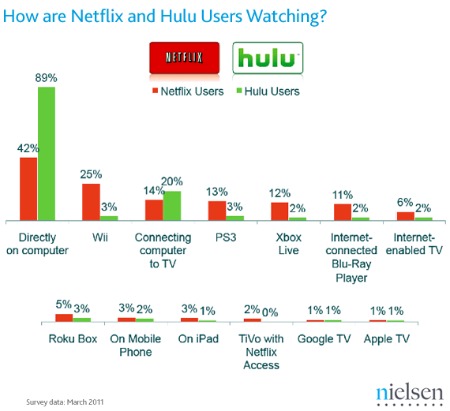Today, Netflix dropped the bomb that it was doing away with its unlimited streaming / DVD combo plan in favor of separate plans for each service. Users (myself included) that want unlimited streaming options as well as 1-DVD-at-a-time rental enjoy a $9.99 a month plan at the time. Soon, that option won’t exist.
Moving forward, Netflix users will have the option of a $7.99 unlimited streaming service. instead of paying $2 extra for the one-at-a-time unlimited DVD service, users will now have to pay another $7.99 a month for that. This basically means that the $9.99 service was just increased about 60% to $15.98 a month.
If I had to sum up the initial reaction to this announcement in a few words, I think I might use “aw hell no.” Maybe just the world “indignant.”
What will Netflix users do now? The twitterverse is sounding off, and I will use varying tweets to discuss possible outcomes of this new pricing structure.
First, will users jump ship from Netflix to other content providers? Will Redbox, Hulu, and even cable companies benefit from the Netflix backlash?
Let’s break this down. Redbox: I get it. No commitment, $1 rentals. Roughly sixteen films from Redbox in one month would equate to the new streaming & DVD Netflix subscription. Users will have to determine whether or not thy can continue to extract enough value out of Netflix to justify the increased cost. Both Netflix and Redbox, however, have deals in place with most studios that make them wait a month before distributing new releases.
As far as Hulu goes, their streaming service is also $7.99 per month. Like Netflix, it too is available on Xbox360. Switching from one to the other doesn’t seem like it’s doing anything except changing the specific content you have access to.
The argument that cable companies will benefit from this pricing shift is one that fails to make sense to me. Using a cable provider’s on-demand service, rentals can run anywhere from $3 to $8 depending on whether or not it is in HD. Rent two or three of those and you are well over $16 for the month. Plus, subscription services like HBO and Showtime aren’t cheap either. The only draw I can see is that on-demand tends to make new releases available earlier than Netflix.
Will users make a choice and simply drop their streaming or DVD plans?
If users choose to drop either DVD or streaming, then their Netflix bill will actually be a little cheaper than before (considering they had both services to begin with).
But of course the streaming and DVD parts of Netflix are yin & yang, peanut butter & jelly. Streaming provides users with content instantly while the DVDs provide users with the content that isn’t offered via instant streaming.
To assuage the angry masses, Netflix should make a few more deals in the coming months to bring more content to streaming. That might help some people cope with the subscription changes.
Is the price increase really that big of a deal?
Suck it up, you whiners. That is one way to interpret the backlash. An extra $6 a month, when extrapolated over the course of a year only totals an extra $72. To someone willing to pay $120 a year for their Netflix experience, is $192 going to break their bank?
And if that answer is no, then is it just about the principle of the thing? People get pissed when something that they come to take for granted is taken away from them. You are used to both streaming and DVDs for a low price? Too bad, says Netflix. It doesn’t “make great financial sense,” as they say on their blog today.
And if the answer is yes, then maybe switching to just one of the two services and paying roughly $96 a year could actually be beneficial.
Screw it, I’m just going to download everything.
Will this pricing change put more people back on torrent sites? It’s not that everyone ever really left them – filesharing still exists (duh). But Netflix and Hulu serve as a companion to filesharing to some.
Will people that choose to only keep their streaming Netflix service simply revert to the internet to get the new releases that they want to watch? It’s definitely possible. And before you say anything, no, I’m not insinuating that Netflix is now responsible for increased piracy.
There’s no doubt that the new subscription structure will affect how people use the service that they love. On a final note, is it crazy to wonder if Netflix is simply taking their first step in completely weeding out physical DVDs from their service?
[Image Courtesy]

























